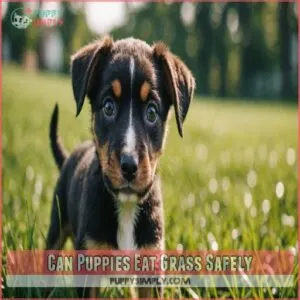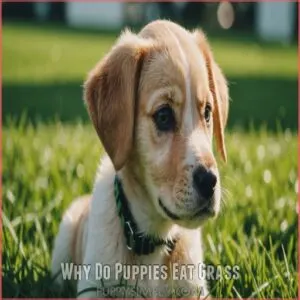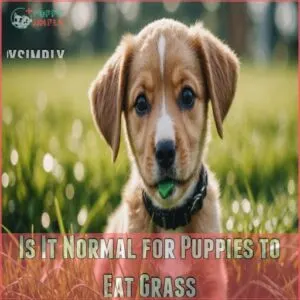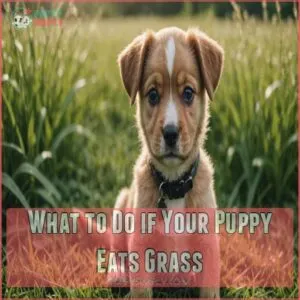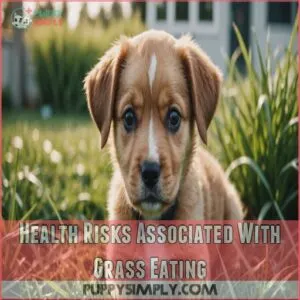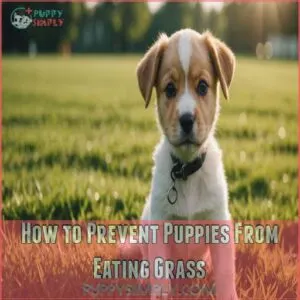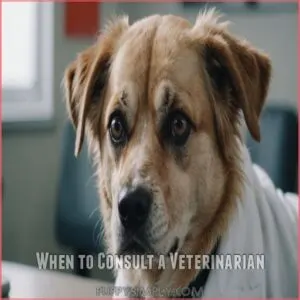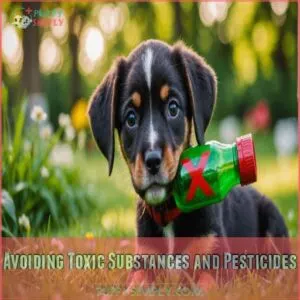This site is supported by our readers. We may earn a commission, at no cost to you, if you purchase through links.
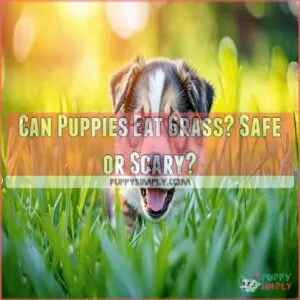 Sure, puppies can eat grass, but there are a few things you should keep an eye on.
Sure, puppies can eat grass, but there are a few things you should keep an eye on.
Often, puppies munch on grass to help with digestion, just like you reaching for a fiber supplement.
However, watch out for lawns treated with pesticides; they can spell trouble for your furry little buddy.
If your puppy eats grass and then gets sick or starts acting strangely, call your vet faster than you can say "walkies!"
Grass-eating is pretty normal, but if they seem to make a salad of your entire yard, there might be more to explore.
Curious about keeping them safe? Stay tuned!
Table Of Contents
- Key Takeaways
- Can Puppies Eat Grass Safely
- Why Do Puppies Eat Grass
- Is It Normal for Puppies to Eat Grass
- What to Do if Your Puppy Eats Grass
- Health Risks Associated With Grass Eating
- How to Prevent Puppies From Eating Grass
- When to Consult a Veterinarian
- Tips for a Safe and Healthy Lawn
- Frequently Asked Questions (FAQs)
- Can dogs eat grass?
- Can a dog eat grass and vomit?
- How do I get my Dog to eat a lot of grass?
- Can dogs eat grass if wormed?
- Should I let my puppy eat grass?
- Can 8 week old puppies eat grass?
- Do puppies eat grass when teething?
- Is it okay for puppies to eat leaves and grass?
- Can grass consumption affect puppy digestion?
- Do puppies eat grass more than adults?
- What breeds are prone to eating grass?
- How does grass affect puppy stool?
- Are there signs of grass allergies in puppies?
- Conclusion
Key Takeaways
- While grass-eating is common, you should always check your lawn for pesticides before letting your puppy graze.
- If your puppy vomits or shows other signs of illness after eating grass, you should consult your vet immediately.
- You can help prevent excessive grass-eating by providing a balanced diet, engaging your puppy in play, and using pet-safe deterrents.
- Persistent grass-eating, coupled with vomiting, diarrhea, or lethargy, warrants a vet visit to rule out underlying health problems.
Can Puppies Eat Grass Safely
You might be wondering if your playful puppy nibbling on grass is safe or risky, and you’re not alone.
While grass eating is common among puppies and can occasionally offer digestive benefits, it’s important to watch for potential hazards like pesticides and intestinal parasites.
Risks of Grass Eating
Eating grass may sound harmless, but it can pose several risks for puppies.
Lawn chemicals, often laden with pesticides, can lead to serious health issues.
And as many as 79% of dogs have been observed eating plants, with grass being the most commonly consumed, highlighting the prevalence of this behavior in dogs eating grass.
There’s also the threat of lawn chemicals and other hazards.
If your pup starts vomiting or showing other signs of distress, you’ll want to consult the vet.
Always err on the side of caution!
Benefits of Grass Eating
Grass eating can actually benefit your pup’s digestion, acting like fiber in their diet.
It might help with stomach discomfort, behaving like a natural antacid.
This quirky canine behavior is a nod to their evolutionary roots, where wild dogs munched on greens.
Plus, removing parasites could be an accidental bonus of grass munching.
Curious, isn’t it?
Commonality of Grass Eating in Puppies
If you’ve ever caught your puppy munching on grass, you’re not alone.
Puppy grass eating is a common sight and part of normal dog behavior.
Most pups dabble in grass consumption, likely driven by curiosity or instinct.
While it might leave you scratching your head, remember it’s usually harmless and quite natural across various breeds.
Relax, it’s part of dog life!
Why Do Puppies Eat Grass
Ever wonder why your adorable puppy munches on grass like it’s a gourmet snack?
Puppies might eat grass to fulfill nutritional needs, ease an upset stomach, or simply out of boredom, making it one quirky doggie habit linked to their wild ancestors.
Nutritional Needs and Deficiencies
Sometimes, puppies munch on grass because they’re missing key nutrients in their diet.
A lack of fiber intake, vitamin deficiencies, or mineral imbalances could spark this green snack craving.
Ensuring a balanced diet or considering dietary supplements might help curb this habit.
Regular dog nutrition tips from your vet can keep your puppy’s nutritional needs in check, ensuring tail-wagging health!
Stomach Upset and Digestion
A touch of tummy trouble? Your pup might be eating grass to boost fiber intake and ease digestive issues. It’s a common way to help with stomach upset, though it’s not a guaranteed cure for vomiting or diarrhea.
You can also consider using products that support grass safe puppies. Think of it as their own natural remedy for gastrointestinal health.
However, if the issue persists, it may be a sign of appetite loss, which can be a symptom of stress, illness, dental issues, or medication side effects, and in such cases, understanding how to get a sick dog to eat is crucial; persistent issues warrant a vet visit; it could signal a problem with their dog food or a more serious dog illness needing dog treatment. Proper dog care includes monitoring their digestion.
Behavioral Conditions and Boredom
Feeling puzzled by your puppy nibbling grass. It’s not always about tummy troubles, as some puppies may be seeking relief from food sensitivities, which is why a well-balanced Grain Free Puppy Nutrition can be very important.
Sometimes, boredom strikes and they turn to grass for entertainment.
Ever noticed separation anxiety or excessive barking? These can signal a lack of engagement. Think of dog behavior modification as a path to dog happiness. Simple games and dog training tips can combat dog anxiety and destructive chewing.
Instinctual Behavior and Evolutionary History
Watching your puppy munch on grass can be baffling, but it’s rooted in their grass-eating ancestors.
Wild canines, like wolves, consumed plants for extra nutrients and fiber.
This instinctual behavior helped with prey digestion and survival instincts.
Understanding this evolutionary history can enrich your dog care tips, offering you a comforting dog owner guide on this quirky, yet natural, habit. By incorporating engaging activities and exercise varieties, as detailed in a comprehensive pet parents guide, you can provide a balanced life for your dog, making this habit less concerning.
Is It Normal for Puppies to Eat Grass
You’re not alone if you’ve caught your puppy munching on grass like it’s the latest doggie snack craze, as this behavior is quite common among our furry friends.
Veterinarians generally consider it normal, but you should watch for signs like excessive vomiting, which might indicate something more serious.
Frequency and Commonality of Grass Eating
For many puppies, munching on grass is as routine as their playful antics.
While grass-eating trends show this behavior is common, it raises eyebrows among new dog owners.
If your pup’s munching away, it’s likely normal, a part of their instinctual habits.
Different dog breeds and ages may vary in grass eating frequency, but mostly, it’s all about curiosity and texture, not cause for concern.
Signs of Normal Vs. Abnormal Grass Eating
It’s normal for puppies to nibble on a bit of grass now and then.
You can also create a safe space for them to enjoy grass by purchasing puppy-friendly grass products from puppy grass solutions.
However, if you notice a sudden behavior change, like increased vomiting frequency, a large grass amount ingested, or appetite and stool consistency changes, it might be time for a checkup.
Keep them engaged with dog training, exercise, and mental stimulation.
Treats and dog owner support can go a long way in maintaining their health.
What to Do if Your Puppy Eats Grass
If you catch your puppy chomping on grass like it’s salad, you’re probably wondering what to do next.
While it’s usually harmless, it’s important to keep an eye on their health and take steps to curb excessive snacking.
Some simple training and fun distractions can help.
Monitoring for Signs of Illness
Usually, grass-munching isn’t a big deal, but keep an eye out.
If you notice that your puppy’s diarrhea persists for more than 48 hours, consult dog diarrhea advice.
Vomiting, diarrhea, or lethargy after your pup’s grassy snack? That’s a red flag.
Notice any appetite change or weight loss? Don’t hesitate; connect with your vet or the dog owner community for advice.
Preventing Excessive Grass Eating
Preventing excessive grass eating in puppies isn’t impossible.
Start by ensuring your lawn is free from harmful dog chemicals and pesticides.
Keep your pup entertained to prevent boredom:
- Engage in regular puppy exercise, like fetch or walks.
- Switch to a high-fiber diet to fulfill nutritional needs.
- Apply grass-eating deterrents on specific areas.
Keep things safe and playful!
Discouraging Grass Eating With Training
When your puppy munches on grass like it’s a salad bar, it might be time to step in with some training tricks.
Positive reinforcement with consistent commands helps steer them away from grazing.
Try offering alternative behaviors, like fetch with fun chew toys.
Use redirection techniques when caught in the act, shifting your pup’s attention to something safer and tastier.
Health Risks Associated With Grass Eating
When your puppy nibbles on grass, it’s not just about taste; there are health risks you need to be aware of.
Grass can harbor toxic pesticides and parasitic worms, turning a playful snack into a potential health hazard.
Toxic Substances and Pesticides
Keeping your puppy’s health in check, consider the dangers lurking in your lawn.
Grass treated with chemicals might pose risks.
Chemical exposure can lead to health issues.
Organic alternatives in lawn care to stay safe.
Learn toxic plant ID to protect your furry friend.
Making these changes helps create safer playtimes outside.
Intestinal Parasites and Worms
Worrying about pesticides is one thing, but grass might welcome uninvited guests like roundworms or hookworms into your pup’s belly.
These creepy crawlies hitch a ride through grass, so it’s smart to keep up with a regular deworming schedule.
Regular parasite testing and fecal exams are like security checks, keeping your puppy’s tummy trouble-free and gleefully wagging.
Underlying Health Issues and Warning Signs
Puppies munching on grass might be sending you a subtle signal.
Watch out for symptoms like vomiting, diarrhea, or weight loss.
These could hint at an underlying issue needing attention.
If your little furball seems lethargic or shows an appetite change, it’s time for a vet visit.
Paying attention early can save you a heap of trouble later.
How to Prevent Puppies From Eating Grass
Want to stop your puppy from munching on grass? Try a combination of providing a balanced diet, engaging them in fun activities, and maybe even using a pet-safe repellent.
Dietary Changes and High-Fiber Food
Feeling puzzled about your puppy’s grass-eating habits?
Maybe it’s time for a dietary shake-up.
Try mixing in fiber-rich treats or consider homemade diets to curb their craving.
Probiotics for pups can also aid digestion, reducing the need to munch on lawn greens.
If food allergies are a concern, check with your vet for potential fiber supplements.
Engaging Puppies With Play and Exercise
When your puppy’s full of beans, steer that energy into a fun exercise routine.
Keep them engaged with safe toys and training games, letting their natural curiosity drive mental stimulation.
Regular puppy play curbs the urge to munch on grass but also builds a strong bond.
Remember, a tired puppy is a happy, grass-free puppy!
Using Deterrents and Repellents
Although it may seem like playing fetch with a salad, using deterrents and repellents can stop grass munching.
Try safe deterrent types like citrus sprays or DIY solutions such as vinegar water.
Their effectiveness varies, but with consistent use, you’ll notice improvement.
Remember, safety is paramount—ensure any repellent alternatives aren’t toxic.
Your lawn and puppy will thank you!
When to Consult a Veterinarian
If your puppy’s grass-eating habit seems more like a five-course meal than a casual nibble, it might be time to visit the vet.
Look out for symptoms such as vomiting, diarrhea, or any other signs of distress, as these could indicate that something’s off.
Signs of Illness or Distress
You’ve tried playtime, treats, and high-fiber food, yet your puppy munches on grass.
Watch for worrying signs like vomiting or diarrhea that might need a vet’s touch.
Puppies that seem unusually lethargic, show weight loss, or lose appetite could be distressed.
Be alert to:
- Vomiting or diarrhea
- Lethargy or weight loss
- Appetite loss or behavior changes
Excessive or Frequent Grass Eating
Spotting signs of illness is important, but noticing your puppy munching grass every ten minutes can be equally concerning.
Are you wondering if this is the plant-based diet they need?
Frequent grass eating might hint at issues needing vet consultation.
It’s not always dietary; sometimes puppies find it irresistible, like candy!
Keep an eye on these things:
| Sad Pup | Worried Owner | Happy Grass |
|---|---|---|
| Tummy Ache | Stress Eating | Perfect Lawn |
| Vet Costs | Sleepless Nights | Leafy Snacks |
| Boredom | Overthinking | Daily Munching |
| Silent Prayers | Anxious Thoughts | Lush Greens |
| Mixed Emotions | Confusion | Safe Fun |
Underlying Health Issues and Concerns
Worries about your pup’s grass-munching?
It’s usually harmless, but persistent grass eating could signal trouble.
Keep an eye out for these warning signs:
- Vomiting
- Diarrhea
- Weight loss
- Lethargy or appetite loss
If you notice any of these, don’t delay; schedule a vet visit.
Early detection is key to keeping your furry friend happy and healthy!
Tips for a Safe and Healthy Lawn
To keep your puppy’s playground safe, choose pet-friendly grass and refrain from using toxic pesticides.
Maintaining a clean yard isn’t just about aesthetics—it’s about ensuring a healthy environment for your furry friend to explore.
Choosing Pet-Friendly Grass and Plants
Creating a puppy-friendly lawn involves wise plant selections.
Consider choosing durable grasses like Bermuda or Buffalo, which stand up to active paws.
For a lush landscape, you can also consider products like puppy grass kits available online, such as puppy grass.
Add safe, non-toxic flowers like sunflowers or marigolds for a splash of color.
Incorporate clover for a soft, lush landscape that’s gentle on paws.
Organic lawn care keeps everything green, healthy, and free from harmful surprises, offering peace of mind.
Avoiding Toxic Substances and Pesticides
You’ve picked the perfect puppy-proof plants, so now let’s keep your lawn chemicals safe.
Avoid toxic substances to protect your furry friend.
Here’s how:
- Choose safe lawn care products that are pet-friendly.
- Opt for organic alternatives to reduce pesticide risks and lawn chemical dangers.
- Regularly check for toxic plant identifications.
Keep your pup happy and healthy!
Maintaining a Clean and Safe Outdoor Environment
While watching out for toxic chemicals, think about keeping your lawn puppy-safe.
Consider consulting pest control professionals to prevent unwanted digging and escapes.
Start with pet-friendly yard practices: use natural fertilizers and safe products to reduce risks, visit dog digging under fence solutions for more information.
Regular lawn care, like mowing and clearing debris, will help maintain a healthy play area.
Add fence safety to your checklist, ensuring curious puppies stay safely contained in their outdoor adventures.
Frequently Asked Questions (FAQs)
Can dogs eat grass?
Many dogs eat grass; it’s often harmless.
Pesticides can be harmful to dogs, so check your lawn for them.
If your dog is eating a lot of grass, or vomiting afterward, see your vet. It might be a sign of something more serious.
Can a dog eat grass and vomit?
Dogs can eat grass and vomit sometimes, which might seem alarming.
Usually, it’s not a big deal—just their way of soothing an upset tummy.
Keep an eye out, though, for signs of illness and consult your vet if concerned.
How do I get my Dog to eat a lot of grass?
Encouraging your dog to munch on grass isn’t recommended since it can lead to digestive issues or exposure to harmful chemicals.
Grass can be harmful to your dog.
Instead, focus on providing a balanced diet and suitable toys for enrichment and play.
Can dogs eat grass if wormed?
Wondering if wormed dogs can munch on grass?
Sure, they can!
Just make sure the grass isn’t treated with nasty chemicals.
Keep an eye out for any tummy troubles, though.
When in doubt, ask your vet.
Should I let my puppy eat grass?
Sure, you can let your puppy munch on some grass, but keep an eye out for dangers like toxins or parasites.
If your pup’s eating habits seem off, a vet visit might be a good idea.
Can 8 week old puppies eat grass?
Nearly 79% of dogs eat plants, and 8-week-old puppies might chew grass out of curiosity.
It’s typically harmless, but keep an eye on them.
Make sure the grass is pesticide-free and watch for any unusual behavior.
Do puppies eat grass when teething?
Puppies might gnaw on grass while teething due to discomfort, much like how babies chew on toys.
It’s a natural exploration phase, but make sure their diet is balanced to minimize excessive grass munching and potential risks.
Is it okay for puppies to eat leaves and grass?
Like a curious explorer, your pup might nibble leaves and grass.
It’s usually fine, but watch for vomiting or diarrhea.
If you’re worried, check with your vet.
A balanced diet‘s key!
Can grass consumption affect puppy digestion?
Sure, grass can affect a puppy’s digestion—it can cause upset stomachs or lead to vomiting.
However, many puppies simply munch on grass for fun.
Keep an eye on them and consult your vet if concerned.
Do puppies eat grass more than adults?
Worried your puppy eats grass more?
Relax, it’s normal.
Puppies are curious and explore their world with their mouths, leading to a bit more grass munching than adults.
As they grow, this typically settles down.
What breeds are prone to eating grass?
There’s no specific breed prone to eating grass; it’s a common behavior across all dog types.
Your playful Labrador or your curious Beagle could munch on grass, often out of boredom or to aid digestion.
How does grass affect puppy stool?
Grass can lend a helping hand to your puppy’s digestion, adding fiber to bulk up stool and ease passage.
Grass can be a helpful snack for your puppy’s digestion, but it’s important to monitor their bowel movements.
If your pup’s droppings change in consistency or frequency after grass-snacking, chat with your vet.
Are there signs of grass allergies in puppies?
You might notice itchy skin, redness, or frequent scratching if your puppy has grass allergies.
Keep an eye out for sneezing or watery eyes, and consult your vet to explore treatment options and manage symptoms effectively.
Conclusion
Imagine this: 68% of puppies nibble on grass regularly.
While it’s common, keeping your furry pal safe is key.
Can puppies eat grass safely?
Mostly, yes—but watch for treated lawns and odd behavior.
Grass can aid digestion, yet excessive munching might signal underlying issues or boredom.
Provide a proper diet, engage them with play, and consult your vet if needed.
By making your yard puppy-friendly, you’re setting the stage for healthy, happy adventures together.

